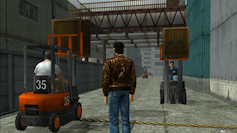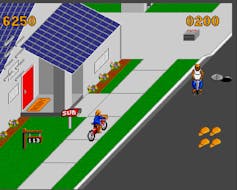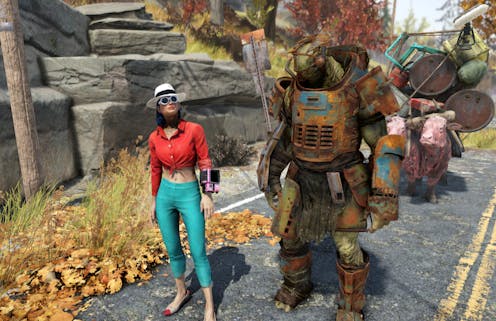Video games are often seen as immersive fantasies, which offer a means of escape from the humdrum chores and duties of everyday life. Games studies scholars speak of players entering a “magic circle”, forged by programmers – “an act apart”, with its own unique rules and rituals. But this way of thinking about games – as simple escapes, stress releases and magic circle worlds – has started to lose its validity.
As much as video games offer escape and emotional release, they also replicate real-world practices. This includes mundane human behaviours and activities, such as hobbies, sports and work, as well as the little details of everyday life. In my new book Gamer Nation, I argue that video games – far from being a frivolous distraction from reality – actually hold a mirror to society and offer a subtle form of social commentary.
Read more: Red Dead Redemption 2: Virtual ecology is making game worlds eerily like our own
The first commercial arcade game – Atari’s Pong (1972) – succeeded by emulating the simple sport of table tennis, putting two bats and a ball on screen. Its predecessor, Computer Space (1971), failed precisely because of its complexity and unfamiliar setting. Thereafter, early video games regularly took their cues from simple human behaviours.
Atari’s Breakout (1976) – an action title based around dismantling a brick wall – replicated simple demolition practices. The idea for the game came to Atari’s Nolan Bushnell while he was on a beach in Hawaii, where he realised that “a game theme that tended to be successful was cleaning things up”. The domestic chore of vacuuming itself became a game in Clean Sweep (1982), created for the MB Vectrex games console.
Scaling up

As technology progressed, so did the scale and detail of real life simulations within video games. In Yu Suzuki’s Shenmue (1999) players explored a detailed recreation of the Japanese city of Yokosuka, roaming city streets and whiling away hours playing darts, shopping and earning money driving a forklift. The “everyday” concept reached its peak with Will Wright’s The Sims (2000), where players assumed responsibility for managing family households, getting human-like sims to attend to their personal hygiene and tidy home furniture.

Video games have even recreated the realm of work. In the early 1980s, digitised jobs included delivering newspapers to suburbia in Atari’s Paperboy and collecting airport baggage in Apollo’s Lost Luggage. Gottlieb’s Reactor combined game physics with nuclear physics, as the player took charge of an atomic reactor, attempting to cool a chain reaction. Nothing about working as a baggage officer or operating a nuclear plant screams “fun”, but video games have successfully transformed the mundane into entertainment.
Limited by technology, 1980s game graphics relied heavily on symbolic representation rather than offering realism. But in recent years, simulations of everyday work have become more sophisticated, including detailed recreations of agriculture (Farming Simulator, 2008 onwards), cooking (Cooking Mama, 2006 onwards) and running prisons (Prison Architect, 2015). There are even titles that mimic Windows 95 and work desktops, to simulate office environments.
Mainstream blockbuster video games also feature far more of the everyday than people might assume. Released in late 2018, Rockstar’s Red Dead Redemption 2 – an epic frontier adventure game – was praised for how it encouraged the player to carry out a range of daily chores, including cleaning guns, brushing horses, shaving and bathing.
Read more: Red Dead Redemption 2: can a video game be too realistic?
Even more fantastical titles, such as Bethesda’s apocalyptic adventure Fallout 76 (2018), remain grounded in everyday activities: a shelter, a clean bed and a cooked meal are as crucial to survival as shooting radioactive mutants.
Familiarity and flow
On the surface, the idea of operating a forklift truck for a dockyard company in Shenmue seems to disappoint the core expectations people have of gaming; it doesn’t provide instant stress relief, offers little freedom or fantasy and fails to create any opportunities for social connectedness. But featuring everyday work and other mundane activities in games does encourage a sense of intimacy and association with the digital game world.
Everyday tasks appeal to players because they are familiar and predictable. Just as people appreciate the “sameness” of fast food chains such as McDonald’s, gamers like to find familiar actions, signposts and settings in their games. Experiencing the everyday in the digital realm gives players a sense of rootedness and grounding.
Taking part in mundane chores also provides a clear sense of achievement, competency and self-validation; players can perfect the knowable and the perfectible. The repetitive quality of such tasks underlines a sense of structure, focus and follow through. Repetition also helps players enter bliss-like states of “cognitive flow”, a mental state of full immersion and enjoyment.
Code as commentary
Programmers cleverly design digital tasks to comment on the challenges of everyday life. Code generates satire, social commentary and criticism of real life. For example, Lucas Pope’s puzzle game Papers, Please (2013) puts the player in charge of border control, highlighting the real world problems of immigration politics.
Video game designers appeal to gamers by offering fake and artificial landscapes marked by novelty and caricature. As Jean Baudrillard and Umberto Eco observed about the appeal of Disneyland, people often prefer the obvious copy over the original and authentic. Video games are no different.
So rather than sideline video games as fun escapes from reality, we can actually see them as, at times, extensions and simulations of everyday activities and daily circumstance, which speak to the human condition. They connect and merge with the real, just as often as they signify a leap into the digital unknown. While fighting in distant galaxies may still seem far fetched, Nintendo’s Mario is, after all, a New York plumber.


